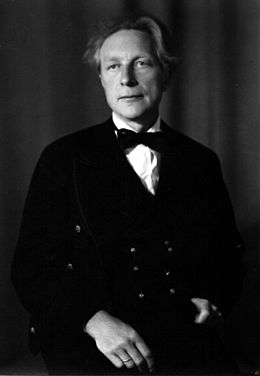Eivind Groven
| Eivind Groven | |
|---|---|

Groven in 1951.
|
|
| Background information | |
| Born |
8 October 1901 Eidsborg, Lårdal |
| Origin | Norway |
| Died | 8 February 1977 (aged 75) Oslo |
| Genres | Classical, traditional folk music |
| Occupation(s) | Musician, composer |
| Instruments | Hardingfele |
| Website | orgelhuset |
Eivind Groven (8 October 1901 – 8 February 1977) was a Norwegian microtonal composer and music-theorist. He was from Telemark and had his background in the folk music of the area.
Groven was born in Lårdal and came from a family of talented musicians and artists, prominent in his home area. His father, Olav Aasmundsson Gøytil, was the youngest of eight siblings, and two of his father's brothers played the hardanger fiddle. His mother, Aslaug Rikardsdotter Berge, was the youngest daughter of Rikard Aslaksson Berge, known for preserving a great amount of old tunes, religious songs and dance-tunes and a friend of Myllarguten's. Two of Groven's maternal uncles also played the hardanger fiddle, and his mother's sisters, as well as Aslaug herself, were talented folk singers. Thus, Groven's rural background was filled with traditional music.
Groven was the youngest of five brothers. Two of his brothers began to play the fiddle, and soon Eivind joined them. His father Olav was also an apt player, and in their childhood, the brothers learned notes, and sometimes played together, when they got their hands on classical sheet music. Otherwise, local folk music ruled. As Eivind grew up, he understood the value of writing down the tunes he heard from other fiddlers, and in this way, he soon gained great knowledge. He was also a skilled mathematician, and early on surpassed his older brothers.
At the age of 16, Groven was infected with a serious case of wet gangrene in the lungs and barely survived it. During his reconvalescent period, he studied music and played the fiddle. He later recalled: "I was free to do whatever I wished in that time".
Eivind Groven studied at Notodden to become a teacher, as his father had been, but soon abandoned this, because music called to him. He studied musical theory and composition for a year, mostly Berlioz and Beethoven. He held Beethoven in highest esteem for the rest of his life, and wished for the 9th symphony anthem to be played at his funeral. Unlike many other young Norwegian composers at the time, he refused to go abroad, but stayed at home, composing, and developing his own distinct musical forms, based on a merging of the sonata form with the special metamorphic principles unique to the dance music from Telemark, closely related to the forms of late baroque.
...
Wikipedia
